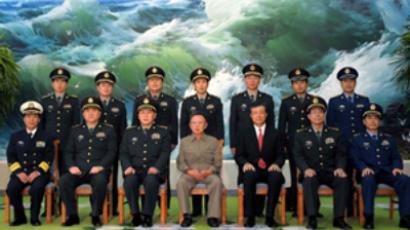North Korean leader Kim Jong-il dies
North Korea's veteran leader Kim Jong-il has died at the age of 69. A tearful announcer at North Korea’s state television, dressed in black, said on Monday the “Dear Leader” had died on Saturday morning of fatigue and over-work.
Kim Jong-il had been battling ailing health in recent years. It is believed he suffered a stroke in 2008.The news has apparently shocked the people of North Korea. Kim Jong-il had ruled the country since the death of his father, Kim Il-sung, in 1994. Kim Jong-il's youngest son, Kim Jong-un, who is in his late 20s, has officially been named as his father’s successor – that is according to Reuters, who cite the country’s Central Telegraph Agency.Meanwhile, as the news broke, Pyongyang's long-standing enemy, South Korea put its armed forces on high alert, while the government has declared the situation an emergency.It is now a mystery for the world as to what is now in store for North Korea with its leader Kim Jong-il gone. However, he was no less mysterious himself while in office.A massive military parade was held in 2008 to mark North Korea’s 60th anniversary. General Kim Jong-il was not there to greet the crowd due to health issues.In 2003, reports claimed Kim Jong-il died of diabetes and had been replaced in public by stand-ins hired previously as a security measure. He never spoke to the media, had a profound fear of flying, and ate with special chopsticks which could detect poison. Rumors have surrounded the so-called Supreme Leader throughout his life – beginning with his birth.
According to one source, he was born in the Soviet Union in 1941 during his father's exile, while Kim Jong-il’s official biography claims Kim Jong-il was born during Japan's occupation of the Korean peninsula in a secret military camp on a sacred mountain. The birth of North Korea’s second leader and the son of its Eternal President was followed, official accounts say, by the appearance of two rainbows and a new star in the heavens."Our people take pride in the fact that they are blessed with great leaders from generation to generation," Yang Hyong Sop, the Vice President of North Korean Parliament has said.The leader of the Democratic People’s Republic of Korea since 1994, he succeeded his father Kim Il-sung and maintained the policy of keeping his country closed to the world. Kim Jong-il was also named Supreme Commander of the People’s Army, one of the largest in the world, with one million active troops and over four million reservists.It is believed enormous funds allocated to its military might ate up North Korea's resources needed to fight famine and other social problems. But Kim Jong-il and his regime tried to put on a different show whenever they allowed the globe a glimpse inside.After the Korean War, the demilitarized zone was drawn up in 1953, sending North and South Korea in two very different directions. Decades on, the North remains a closed communist state, while the South is a modern democracy and innovative success story.North Korea has caused global outrage in recent years, testing patience by carrying out underground nuclear tests and short-range missile launches, leading to US and UN financial and military sanctions."It is now not a matter of the United States and North Korea, it is really a matter of the region saying to North Korea that it has to change its behavior," US Secretary of State (2005-2009) Condoleezza Rice once said.Russia has tried to be a mediator for peace on the peninsula by pushing for negotiations."In the Asia-Pacific region there's serious potential for conflict and there's no alternative but to set up dialogue and improve understanding between the sides," said Russian President Dmitry Medvedev.In 2010, a new buzz emerged around the North with talk of the possible next leader; as Kim Jong-un became a four-star general and moved into first in line to take over from his father.November 2010 saw tensions reach their highest point in decades after the North launched an artillery strike that left four people dead. South Korea continued to hold large-scale war games with the US and Japan, and warned conflict would break out if another attack was launched.Now, Kim Jong-un, a young and inexperienced leader, has the keys to the country in his hands. The question is whether he will open the door or continue to keep it shut.













